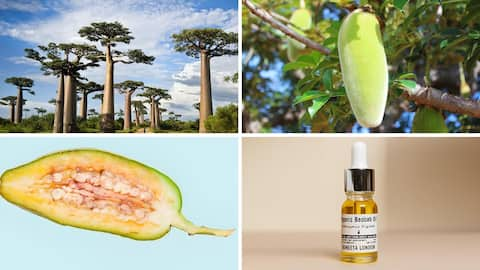Exploring the skincare marvels of the baobab plant
What's the story
The baobab tree, scientifically referred to as Adansonia, is a remarkable plant native to Africa, celebrated for its striking appearance, incredible lifespan, and extraordinary nutritional and medicinal qualities. Also called "the tree of life" and "pharmacy tree" in Africa, it has recently gained attention in the beauty and skincare world for its numerous advantages in promoting skin health and enhancing beauty.
Details
Nutritional profile of baobab fruit
The true gem of the baobab tree is its fruit, a sizable, greenish-brown pod with a soft exterior. The fruit houses a powdery substance packed with an impressive array of vitamins and minerals, such as vitamins A and C, potassium, magnesium, and antioxidants. Baobab oil is rich in omega-3 fatty acids and other beneficial fats like palmitic acid, linolenic acid, oleic acid, and linoleic acid, which play a crucial role in boosting skin radiance and smoothness.
What Next?
Skin healing benefits of baobab
The baobab fruit powder is exceptionally rich in compounds that help retain moisture, revitalizing the skin from within. Its antioxidant properties protect the skin from free radicals that damage healthy cells, leading to a decrease in early aging signs like fine lines and wrinkles. Vitamin C in baobab is essential for collagen production, preserving skin elasticity and firmness. Moreover, compounds present in baobab display strong anti-inflammatory characteristics that calm irritated skin and help relieve conditions such as dermatitis and inflammation.
Insights
Uses in beauty products
Traditionally, the oil extracted from baobab seeds has been used topically to moisturize and heal the skin. The fruit's pulp, consumed as a dietary supplement, also contributes to overall skin health. Today, baobab extract is a sought-after ingredient in moisturizers, lotions, serums, anti-aging products, and hair care items due to its intense hydration, antioxidant-rich nature, and moisturizing properties.
Side effects
Potential side effects
However, it is crucial to be aware of potential allergic reactions and perform a patch test to ensure it is compatible with your skin. As of yet, there is not enough evidence on baobab to understand the recommended daily intake dose for effective results. However, those with specific allergies or sensitivities must consult a dermatologist before incorporating baobab-based products into their skincare routine.
